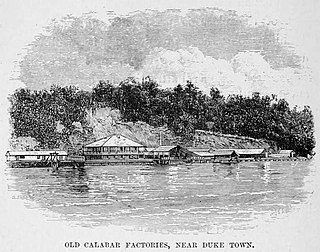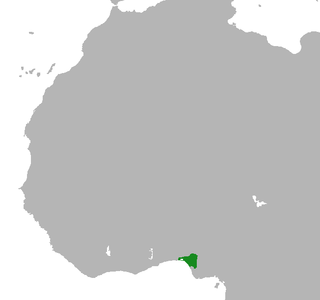 W
WThe Adamawa Emirate is a traditional state located in Fombina, an area which now roughly corresponds to areas of Adamawa State and Taraba state in Nigeria, and previously also in the three northern provinces of Cameroon, including minor Parts of Chad and the Central African Republic. It was founded by Modibo Adama, a commander of Sheikh Usman dan Fodio, the man who began the Fulani jihad in 1809. The capital was moved several times until it settled in Yola, Nigeria on the banks of the Benue River in Nigeria around 1841. At the time of Adama's death his realm encompassed parts of modern Nigeria and much of north Cameroon. It was technically part of the Sokoto Caliphate, and it had to pay a tribute to the leaders in Sokoto.
 W
WThe Agaie Emirate was a state created by Malam Baba, a Fulani warrior who conquered the Nupe people of the area in 1822. Its seat was the present town of Agaie in Niger State, Nigeria, and was subject to the Sokoto Caliphate. Baba's son Abdullahi was inaugurated as the first emir of Agaie in 1832. The Agaie Emirate comprised one part of the old Nupe Kingdom, the others being the Bida Emirate and the Lapai Emirate.
 W
WThe Akure Kingdom is a traditional state with headquarters in Akure, Ondo State, Nigeria. It is the successor to an ancient Yoruba city state of the same name. The ruler bears the title "Deji of Akure".
 W
WAkwa Akpa, known to European colonists as Old Calabar or Duke Town, was an Efik city-state that flourished in the 19th century in what is now southern Nigeria. The City State extended from now Calabar to Bakassi in the east and Oron to the west. Although it is now absorbed into Nigeria, traditional rulers of the state are still recognized. The state occupied what is now the modern city of Calabar.
 W
WAtyap Chiefdom is a Nigerian traditional state of the Atyap people, located on the upper Kaduna River basin of the central Nigeria plateau in the Middle Belt. Its headquarters is at A̠tak Njei, Zangon Kataf (Maba̠ta̠do), southern Kaduna state, Nigeria.
 W
WThe Bade Emirate is a traditional state with headquarters in Gashua, Yobe State, Nigeria. Alhaji Abubakar Umar Suleiman is the 11th Emir of Bade, turbaned on 12 November 2005.
 W
WThe Bauchi Emirate was founded by Fula in the early 19th century in what is now Bauchi State, Nigeria, with its capital in Bauchi. The emirate came under British "protection" in the colonial era, and is now denoted a traditional state.
 W
WThe Bida Emirate is a traditional state in Nigeria, a successor to the old Nupe Kingdom, with its headquarters in Bida, Niger State. The head of the state is the Etsu Nupe, considered the leader of the Nupe people.
 W
WThe Biu Emirate is a traditional state based in Biu in Borno State, Nigeria. Prior to 1920 it was referred to as the Biu Kingdom. The current ruler, who is on 14 September 2020 declared dead, was Maidalla Mustafa dan Aliyu(b. 1915) who became Mai Biu, also styled Kuthli, in 1959.
 W
WThe Borgu Emirate is a Nigerian traditional state with its capital in New Bussa, Niger State, Nigeria. The Emirate was formed in 1954 when the Bussa and Kaiama emirates were merged. These emirates, with Illa, were formerly part of the Borgu state, which was partitioned between the French colony of Benin and the British protectorate of Nigeria in 1898.
 W
WThe Borno Emirate or Borno Sultanate is a traditional Nigerian state formed at the start of the 20th century. It is headed by descendants of the rulers of the Bornu Empire, founded before 1000. The rulers have the title Shehu of Borno. The traditional Emirate of Borno maintains a ceremonial rule of the Kanuri people, based in Maiduguri, Borno State, Nigeria, but acknowledged by the 4 million Kanuri in neighbouring countries.
 W
WThe Damaturu Emirate is a Nigerian traditional state based in Damaturu, the capital of Yobe State, Nigeria. It is a first-class emirate.
 W
WThe Daura Emirate is a religious and traditional state in Northern Nigeria, the Emir of Daura still rules as a ceremonial hereditary monarch, and maintains a palace. Muhammad Bashar became the emir in 1966, reigning for 41 years until his death in 2007, On 28 February 2007, Umar Faruk Umar became Emir of Daura succeeding Muhammad Bashar.
 W
WThe Dikwa Emirate is one of the successor states to the old Bornu Empire, a traditional state within Borno State, Nigeria. It was established in 1901 at the start of the colonial period after the Bornu empire had been partitioned between the British, French and Germans.
 W
WEgba Ake, otherwise known as Egba Alake, is one of the five sections of Egbaland, the others being Oke-Ona, Gbagura, the Owu and Ibara. It is a traditional state which joins with its bordering sections to form something of a high kingship. The Alake of Abeokuta, or Alake of Egbaland, is the traditional ruler of the Egba clan of Yoruba in the city of Abeokuta in southwestern Nigeria.
 W
WEgba Gbagura is one of the five sections of Egbaland, the others being Ake, Oke-Ona, the Owu and Ibara. It is a traditional state which joins with its bordering sections to form something of a high kingship.
 W
WThe Gombe Emirate is a traditional state in Nigeria that roughly corresponds in area to the modern Gombe State. Gombe state also contains the emirates of Dukku, Deba, Akko, Yamaltu, Pindiga, Nafada and Funakaye. The current Emir of Gombe is Alhaji Abubakar Shehu Abubakar III, who acceded on June 6, 2014. The late Emir of Gombe, Alhaji Shehu Usman Abubakar, had been Emir since August 1984.
 W
WThe Idoani Confederacy is a traditional state based in the town of Idoani in the Ose Local Government Area of Ondo State, Nigeria. The origins of the state date back at least to 15th century, when the Oba Ozolua "the Conqueror" fathered the Alani of Idoani, which he made a vassal state of the Benin Empire.
 W
WIjebu was a Yoruba kingdom in pre-colonial Nigeria. It was formed around the fifteenth century. According to legend, its ruling dynasty was founded by Obanta of Ile-Ife. Its contemporary successor is one of the country's traditional states.
 W
WThe Ilorin Emirate is a traditional state based in the city of Ilorin in Kwara State, Nigeria. It is a prominent city largely populated by the Yoruba speaking people group of West Africa. It is considered by some to be one of the Banza Bakwai, or copy-cats of the Hausa Kingdoms.
 W
WThe Iwo Kingdom is a traditional state based on the city of Iwo in Osun State, Nigeria. The Yoruba kingdom, whose ruler is titled "Oluwo of Iwo", was established in the 14th century AD.
 W
WThe Kalabari Kingdom, also called Elem Kalabari, is the independent traditional state of the Kalabari people, an Ijaw ethnic group, in the Niger River Delta. It is recognized as a traditional state in what is now Rivers State, Nigeria.
 W
WThe Kano Emirate is a traditional state in Northern Nigeria with headquarters in the city of Kano, capital of the modern Kano State. Preceded by the Emirate of Kano the council was formed in 1903 after the British pacification of the Sokoto Caliphate.
 W
WThe Kebbi Emirate, also known as the Argungu Emirate is a traditional state based on the town of Argungu in Kebbi State, Nigeria. It is the successor to the ancient Hausa kingdom of Kebbi. The Emirate is one of four in Kebbi State, the others being the Gwandu Emirate, Yauri Emirate and Zuru Emirate.
 W
WThe Kingdom of Benin, was a kingdom in West Africa in what is now southern Nigeria. It is not to be confused with Benin, the modern-day nation-state. The Kingdom of Benin's capital was Edo, now known as Benin City in Edo state. The Benin Kingdom was "one of the oldest and most highly developed states in the coastal hinterland of West Africa". It was formed around the 11th century AD", and lasted until it was annexed by the British Empire in 1897.
 W
WThe Kingdom of Bonny, otherwise known as Grand Bonny, is a traditional state based on the town of Bonny in Rivers State, Nigeria. In the pre-colonial period, it was an important slave trading port, later trading palm oil products. During the 19th century the British became increasingly involved in the internal affairs of the kingdom, in 1886 assuming control under a protectorate treaty. Today the King of Bonny has a largely ceremonial role.
 W
WThe Kontagora Emirate is a traditional state with the capital city of Kontagora, Niger State, Nigeria.
 W
WThe Lapai Emirate, today in Nigeria, is a traditional state that lies near the Gurara River, a tributary to the Niger River, formerly originally inhabited where Gbari People, and presently came under the power of Nupe people, covering roughly the same area as the modern Lapai local government area.
 W
WThe Nembe Kingdom is a traditional state in Niger Delta. It includes the Nembe and Brass Local Government Areas of Bayelsa State, Nigeria. The traditional rulers take the title "Amanyanabo". Today, leadership is split between the Amanyanabos of Ogbolomabiri, Bassambiri, Okpoama, Odioama and Twon Brass.
 W
WOkpe is a kingdom in Delta State, Nigeria. Today, it is also the name of a local government area. It is one of the many kingdoms that make up Urhobo tribe. Its capital is Orerokpe. The kingdom plays host to the Warri Airport, which is actually located at Osubi and the Delta State Trade Fair Complex.
 W
WThe Oyo Empire was a Yoruba empire of what is today Benin and Western Nigeria. The Oyo Empire grew to become the largest Yoruba state. It rose through the outstanding organizational and administrative skills of the Yoruba people, wealth gained from trade and its powerful cavalry. The Oyo Empire was one of the most politically important states in the entirety of Western Africa from the mid-7th to the late 18th century, holding sway not only over most of the other kingdoms in Yorubaland, but also over nearby African states, notably the Fon Kingdom of Dahomey in the modern Republic of Benin to the west.
 W
WPatigi Emirate is Nigeria traditional state founded 1898 by Idrissu Gana I the first monarch of the emirate, the name patigi means ' small hill ' the emirate situated in pategi local government of kwara State and the capital of Pategi.
 W
WThe Potiskum Emirate is a traditional state in Nigeria, with headquarters in Potiskum, Yobe State. The emir holds the title "Mai".
 W
WThe Sultanate of Sokoto is a traditional state in Northern Nigeria with headquarters in the city of Sokoto, capital of the modern Sokoto State. Preceded by the Sokoto Caliphate, the council was formed in 1903 after the British pacification of the caliphate.
 W
WThe Suleja Emirate is a Hausa principality in what is now Niger State, Nigeria. The emirate was established as the Abuja Emirate during the 19th century, located just north of the site of the present-day federal capital city named Abuja. When the new city was established, the emirate and its capital were renamed the Suleja Emirate and Suleja. The emirate covers about 1,150 square miles of wooded savanna area.
 W
WThe Wukari Federation is a traditional state in Nigeria, a successor to the Kwararafa state of the Jukun people. The state is based in the town of Wukari in Taraba State, in the south of the Benue River basin. The ruler takes the title "Aku Uka".
 W
WThe Zazzau, also known as the Zaria Emirate, is a traditional state with headquarters in the city of Zaria, Kaduna State, Nigeria. The current emir of Zazzau is Alhaji Ahmed Nuhu Bamalli who succeeded the former emir, late Alhaji Shehu Idris.